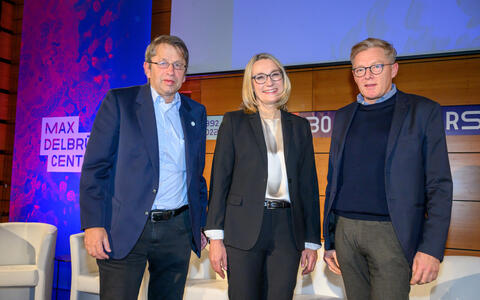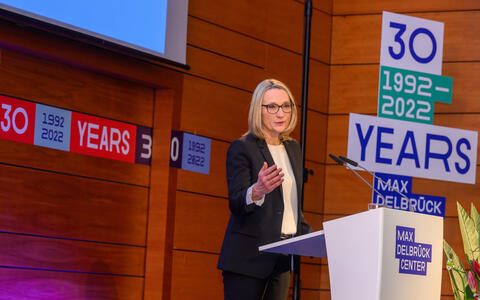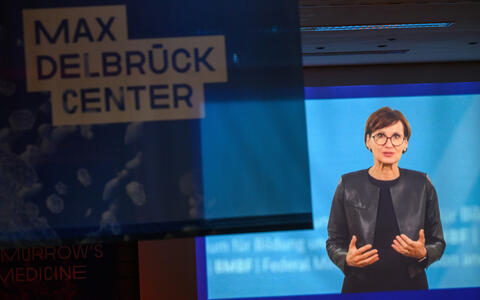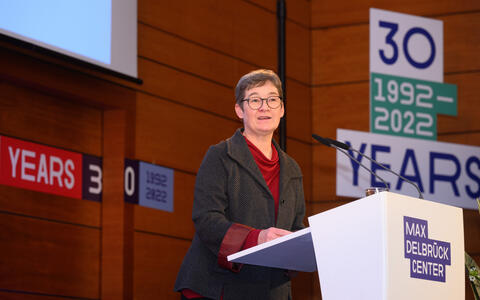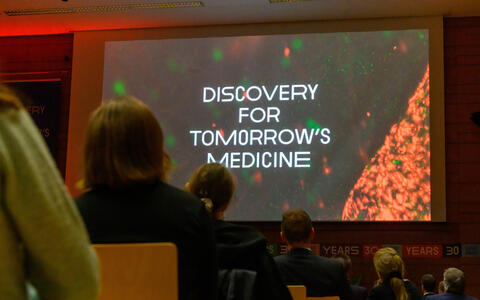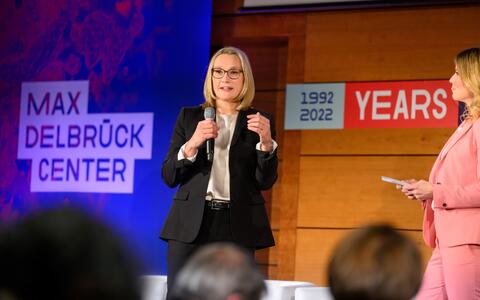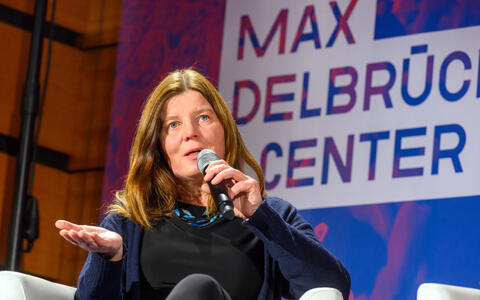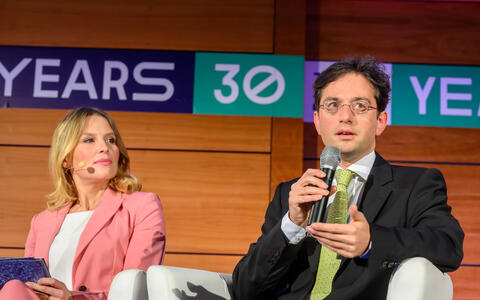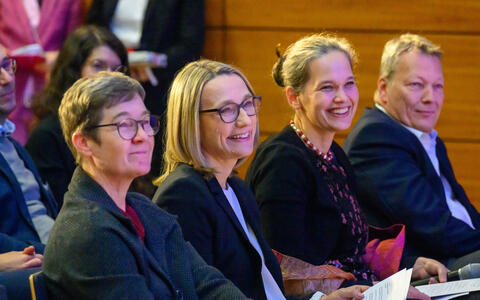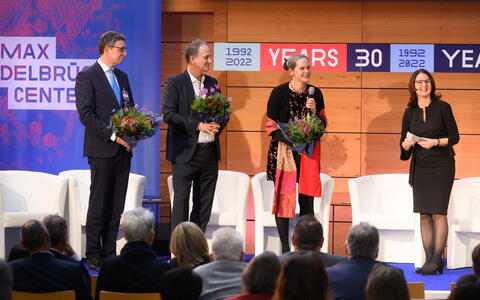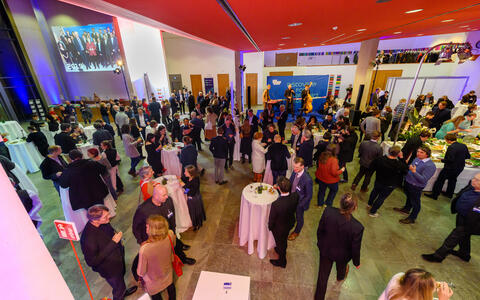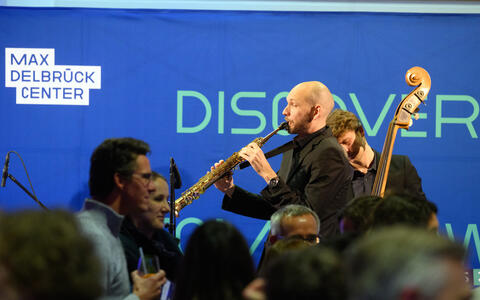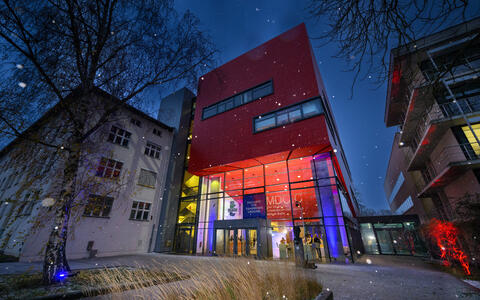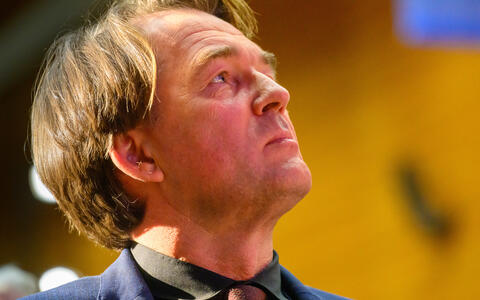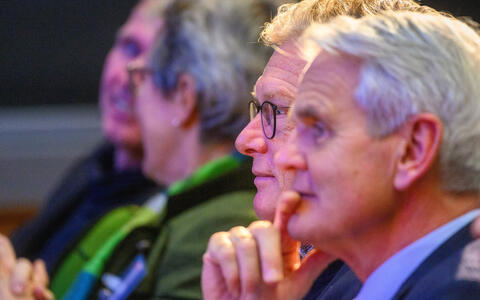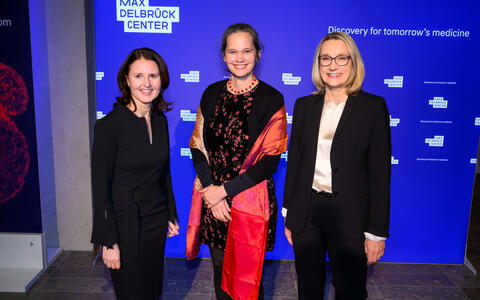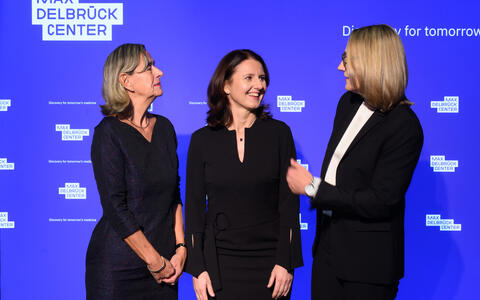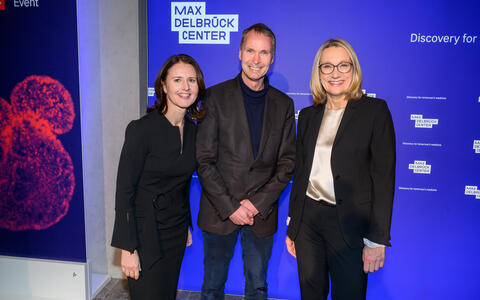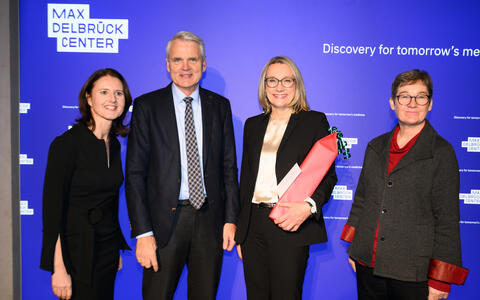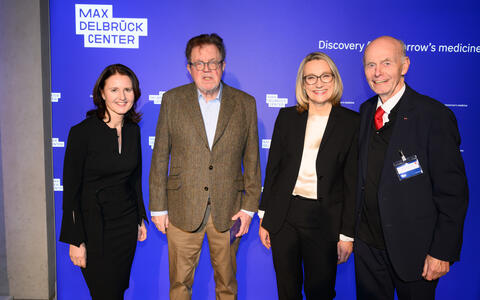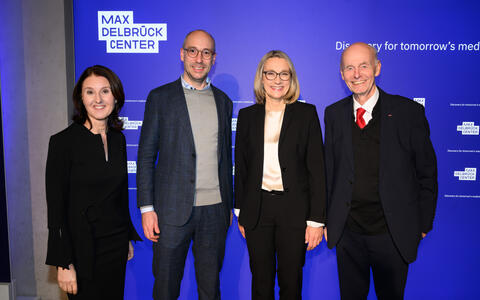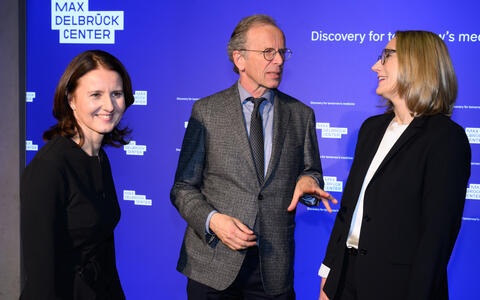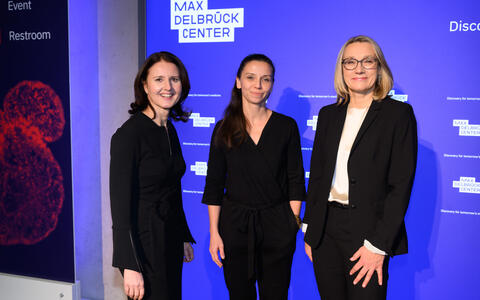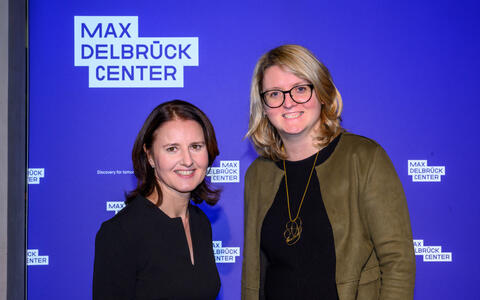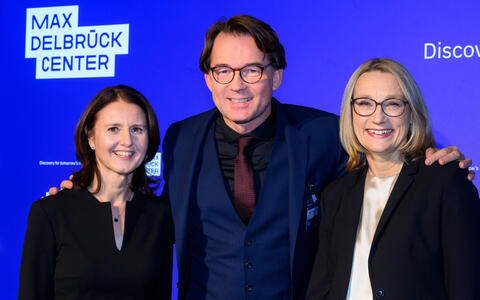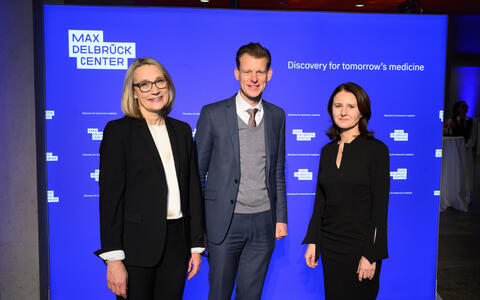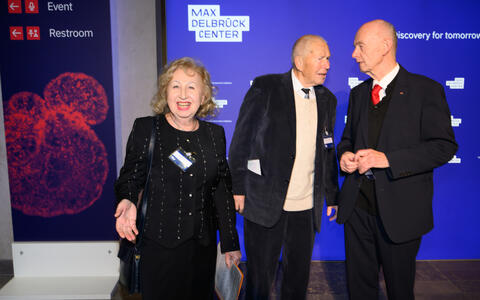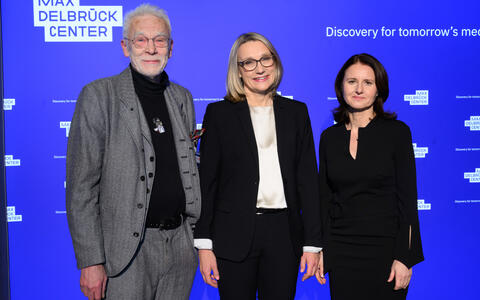Max Delbrück Center celebrates 30th anniversary
Around 300 guests from politics, science, and surrounding communities gathered to celebrate the Max Delbrück Center for Molecular Medicine in the Helmholtz Association 30th anniversary on December 7, 2022. The motto was “Discovery for tomorrow’s medicine.” Professor Maike Sander, the new Scientific Director, presented her vision for the Max Delbrück Center as she took office. "Basic research as conducted at the Max Delbrück Center opens opportunities for medical innovation. The insights allow for the development of more precise treatments and help devise new diagnostic approaches," said Sander. “We cannot stop at just publishing our work. Innovation cannot have an impact until it finds medical applications. In Berlin, excellent conditions for biomedical innovation have been established, including the Charité and the Berlin Institute of Health as strong clinical partners and an emerging biotechnology sector.”
At the forefront of health research in Berlin: Heyo K. Kroemer, Chief Executive Officer of Charité - Universitätsmedizin Berlin, Maike Sander, Scientific Director of the Max Delbrück Center and Christopher Baum, Chairman of the Board of Directors of the Berlin Institute of Health (BIH) (from left to right).
Referencing her experience and familiarity with the biotech communities in Silicon Valley and San Diego in California, Maike Sander emphasized the importance of such an ecosystem. She provided several reflections and insights from her nearly three decades of work in the context of diabetes research in the United States. “Medical progress requires a collaborative framework between academic research and biotechnology. My priority will be to lower barriers for academic research to find medical applications by strengthening infrastructure for knowledge transfer.”

Improving human health
Sander underscored the excellence of the scientists at the Max Delbrück Center: “Here, we aim to uncover overarching mechanisms relevant to a wide spectrum of diseases. Our teams pursue systems medicine, a forward-looking approach. For us, constant innovation is essential. We are leaders in DNA, RNA and protein technologies, and will further develop optical imaging in the future. Researchers here and elsewhere are currently creating accurate maps of all DNA and RNA, and of proteins and metabolites on a single cell level. These technologies will enable us to grasp the complexity of life more completely than ever before. We can directly observe when a cell deviates from the path of health and analyze what tips it toward disease. We can then use mini-organs derived from human cells as models to understand what initiates a disease process. This knowledge lays the foundations for new approaches in prevention, diagnostics and therapy."
Among those congratulating the MDC and Prof. Sander was Federal Research Minister Bettina Stark-Watzinger. In her welcoming words, she stated:
"I extend my heartfelt congratulations to the Max Delbrück Center on its birthday! 30 years of cutting-edge biomedical research, 30 years of development into a leading international life science institute. The MDC has enjoyed an excellent reputation internationally for quite some time. I am particularly pleased that Maike Sander is the first woman to lead the MDC. She perfectly represents what is part of the MDC's mission and our goal in research funding: To translate new discoveries from basic science as quickly as possible into clinical applications and thus to the patients. Maike Sander is a great asset for Germany as a research hub. I sincerely wish her a great start and the entire MDC continued success."
History of success after Germany's reunification
In her speech, Ulrike Gote, Berlin’s Senator for Higher Education and Research, Health, Long-Term Care and Gender Equality said:
“The history of the Max Delbrück Center is one of Berlin's success stories, a story of achievement after German reunification. From the very beginning, the MDC has been a magnet for outstanding international researchers. Here is where many ambitious young scientists from all over the world start their careers. With now nearly 1,800 employees and an excellent reputation in basic research in molecular medicine, the MDC is a key player for the Berlin Health Capital. The fact that we have succeeded in recruiting Professor Maike Sander from San Diego as the scientific director for the MDC shows how attractive Berlin is as a location for biomedicine. Two women now lead the Max Delbrück Center. As Berlin’s Senator for gender equality and research, I am obviously very pleased about this. Their leadership breaks ground in a research community still dominated by men in which the goal of equality is still quite far away.”
„Enormous brain power, incredible know-how“
A participant in the panel discussion: Matthias Tschöp, Scientific Director Helmholtz Munich and designated Research Field Coordinator Health in the Helmholtz Association.
Dirk Heinz, Scientific Director of the Helmholtz Centre for Infection Research (HZI) and Christopher Baum, Chairman of the Board of BIH; in the background is Jutta Koch-Unterseher (Senate Department for Science, Health, Care and Equality) in conversation with Volker Haucke, Director at the Leibniz Research Institute for Molecular Pharmacology (FMP) (from left to right).
Professor Otmar D. Wiestler, President of the Helmholtz Association, said:
“Happy birthday, Max Delbrück Center! Here's to the next 30 years of successful health research. Since it was founded, the MDC has matured to become a key player in the community and a biomedical research institution of international renown. This is where enormous brain power and incredible know-how come together. Through their research, the colleagues create the blueprints for new medical treatments and diagnoses. Professor Sander is not only an excellent medical expert and diabetes researcher. She is also an outstanding and inspiring leader. She has a sharp eye for talent, stands for collaboration as equals and has a keen sense for medical innovation. With all my heart, I wish Maike Sander the best success and enjoyment of the exciting task ahead of her.”
Improving prevention, diagnostics, and treatment
For three decades, researchers at the Max Delbrück Center have devoted themselves to their mission of understanding the underlying molecular causes of disease and health and applied their findings as quickly as possible to clinical applications – in other words, to improve prevention, diagnostics and treatment. Their focus is not on a single organ or one particular disease, but on systems medicine. Down to the smallest level of genes, proteins or molecules, teams investigate what controls or disturbs the equilibrium in a cell, an organ or the entire body. The Max Delbrück Center was founded in 1992 by Detlev Ganten on the Campus Buch in Berlin, with 350 scientists from both the former East and West Germany. Today, around 1,800 people, including employees and guest researchers, from more than 70 countries work call the Max Delbrück Center home, either the original campus in Buch or the second site in Berlin-Mitte, the Berlin Institute for Medical Systems Biology. "It is our employees, with their passion and their very own creativity and motivation, who are the driving force behind our research center, our culture and our successes," said Professor Heike Graßmann, Administrative Director of the Max Delbrück Center, at the ceremony.
Two start-ups and 571 patents
Over its short 30-year tenure, the Max Delbrück Center has already established itself as a premiere internationally recognized biomedical research institution. The teams at the Max Delbrück Center are among the world’s leaders in single-cell biology, vascular medicine, immunology, and research on neurological diseases and pain. Several teams have been instrumental in mapping the human heart, resulting in the creation of the Human Heart Atlas. Collaborative efforts of othe labs at the Max Delbrück Center have led to the development of two medications, one for leukemia and one for a hereditary blood-clotting disorder, which are now part of clinical practice. Several spin-off companies originating at the Max Delbrück Center are currently preparing therapies for market approval, including an immunotherapy for cancer and a targeted stem cell therapy for muscular dystrophy. The center holds patents for technologies in 86 areas (including products and applications), with a total of 571 successful patents worldwide. A total of 26 scientists currently working at the Max Delbrück Center have received a coveted European Research Council (ERC) grant. During the pandemic, scientists at the Max Delbrück Center focused on interdisciplinary research on COVID-19.
Further information
- On Maike Sander and her research
- On the history of the Max Delbrück Center
Contact
Jutta Kramm
Head of the communications department
Phone: +49 30 9406-2140
jutta.kramm@mdc-berlin.de or presse@mdc-berlin.de
- Max Delbrück Center
-
The Max Delbrück Center for Molecular Medicine in the Helmholtz Association (Max Delbrück Center) is one of the world’s leading biomedical research institutions. Max Delbrück, a Berlin native, was a Nobel laureate and one of the founders of molecular biology. At the locations in Berlin-Buch and Mitte, researchers from some 70 countries study human biology – investigating the foundations of life from its most elementary building blocks to systems-wide mechanisms. By understanding what regulates or disrupts the dynamic equilibrium of a cell, an organ, or the entire body, we can prevent diseases, diagnose them earlier, and stop their progression with tailored therapies. Patients should be able to benefit as soon as possible from basic research discoveries. This is why the Max Delbrück Center supports spin-off creation and participates in collaborative networks. It works in close partnership with Charité – Universitätsmedizin Berlin in the jointly-run Experimental and Clinical Research Center (ECRC), the Berlin Institute of Health (BIH) at Charité, and the German Center for Cardiovascular Research (DZHK). Founded in 1992, the Max Delbrück Center today employs 1,800 people and is 90 percent funded by the German federal government and 10 percent by the State of Berlin.


